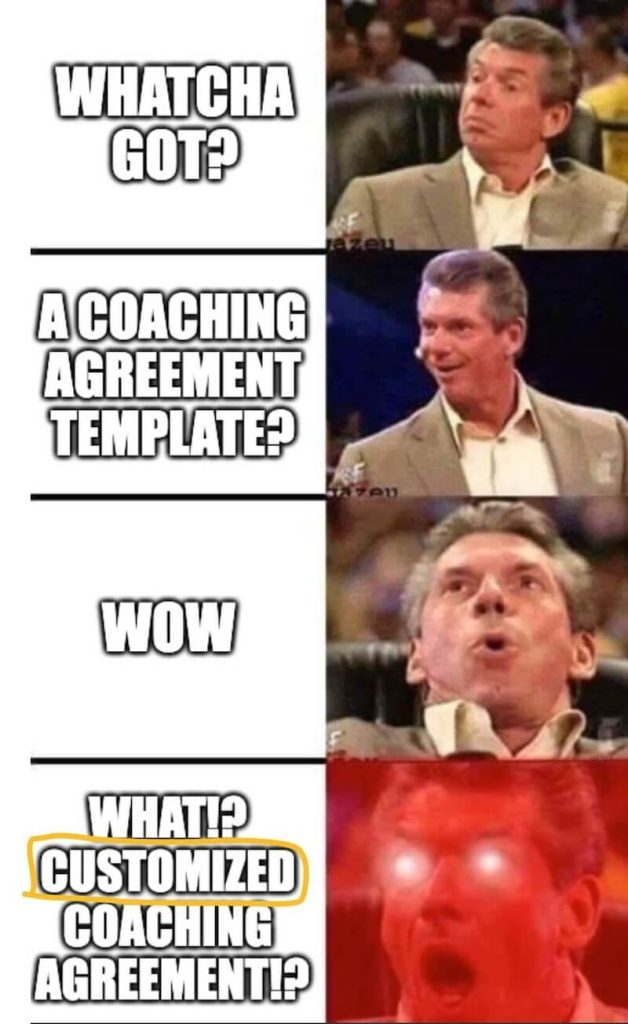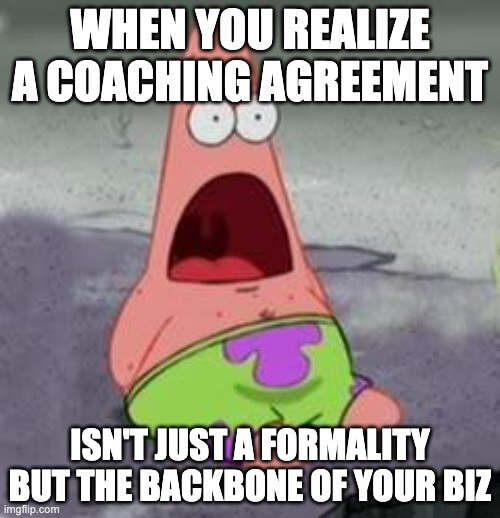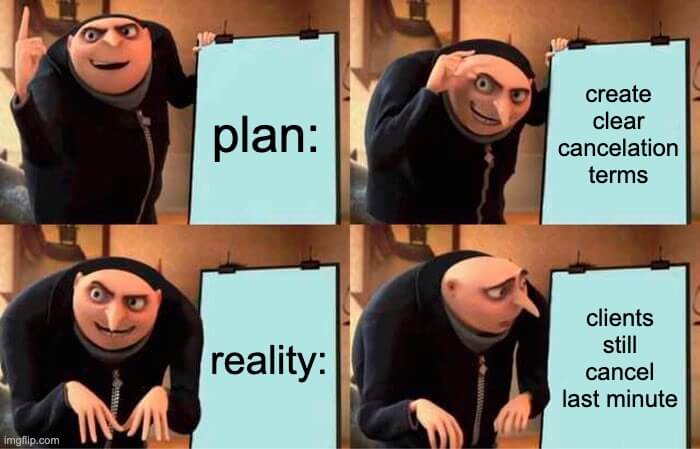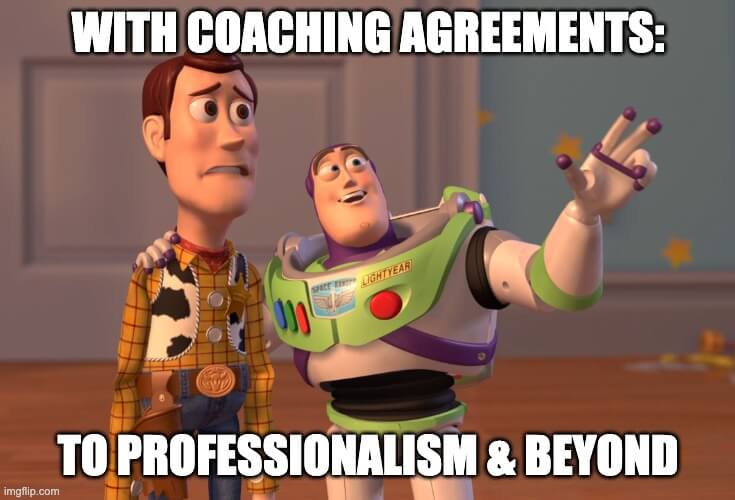
The Coaching agreement template is below, but first…
Want something even better than a template?
I’m talking about a free, CUSTOMIZED coaching agreement for YOUR coaching business, unique to you.
Coaching Agreement / Contract Generator
Answer the questions below to get a PERSONALIZED Coaching Agreement / Contract for YOUR coaching business:
Please review your answers, then click "Generate".
What type of coaching do you offer, and how are sessions delivered? (E.g. Life, business, health coaching; session formats like in-person, online, or phone; and any support provided between sessions such as email or text)
What are your expectations for the coaching relationship? (Include goals for clients, responsibilities of both parties, and how progress will be tracked)
What is your fee structure and payment policy? (Include session pricing, payment methods, due dates, and payment plans)
What are your policies for cancellations, rescheduling, refunds, and ending the agreement? (Include rules for missed appointments, required notice periods for cancellations, refund terms, and termination conditions)
What are your full name, business name (if applicable), and contact details? (Include address, phone number, and email address)
Do you operate under a registered business entity? (E.g. LLC, sole proprietorship, etc.)
The Template
Download the coaching agreement template here.
Coaching Agreement 101
A coaching agreement is more than just a piece of paper; it’s the foundation of a coaching relationship.

Whether you’re a life coach, business coach or fitness coach, having a clear and structured agreement sets the tone for professionalism and trust.
Think of it as a map that outlines the journey you and your client will take together.

It defines the roles, responsibilities and expectations of both parties so there’s no room for miscommunication. It protects you as a coach and gives your clients the peace of mind they’re in good hands.
In this article we’ll cover everything you need to know about coaching agreements, from the key elements to using templates. We’ll also show you how to customize a template to fit your coaching style and share free resources to get you started. Let’s get started!
Elements of a Coaching Agreement/Contract
A good coaching agreement is like a safety net for both the coach and the client. It ensures everyone is on the same page and avoids potential conflicts. Here are the must haves:
1/ Goals for the Coaching Relationship
Define the purpose of the coaching relationship.
What does the client want to achieve?
Setting specific, measurable goals keeps everyone focused and aligned. Have an open conversation to understand the client’s desires and challenges, craft realistic goals that deepen the connection between coach and client.
Review and update these goals periodically to ensure they remain relevant and aligned with the client’s changing needs.
This goal setting flexibility is key in the coaching services provided so you can adapt to changes in the client’s circumstances or priorities.
2/ Roles and Responsibilities
Define the expectations for both the coach and the client.
The coach will provide guidance, keep confidentiality, deliver high quality coaching services and adhere to the International Coach Federation (ICF) code of ethics. This means supporting the client’s growth and enforcing strict compliance with agreed terms to ensure effective coaching.
The client will communicate honestly, share information and actively participate in the coaching process. They will attend sessions, complete tasks and implement what they learn. The client acknowledges the coach’s guidance is not a substitute for professional advice in other areas.
By defining these roles both parties are aligned and the foundation of the coaching relationship is set and commitment to achieving the desired outcomes.
3/ Scope of Services
Describe the coaching services. This includes the number of sessions, length of sessions and format (in-person, virtual or hybrid). If additional support like email or text is offered mention it here.
A clear description of the services is important. Specify the frequency and length of sessions, weekly, bi-weekly or monthly and set clear expectations for each session length, 60 or 90 minutes. Also define the session format – in-person, virtual or hybrid – so both parties are prepared.
And if the coaching includes extra support like email or text communication outline the guidelines for this. So both the coach and client know the availability and response expectations and have a transparent coaching relationship.
4/ Confidentiality Clause
Coaching is about trust, so confidentiality is a must. It’s non-negotiable.
Nobody wants their private information leaked. Make sure to include a clause that all information shared is private.
This way the client is more willing to honestly share their problems and struggles. If they don’t truthfully tell you what’s bothering them, there’s no way for you to help them.
5/ Fees and Payment Terms
This is the probably the most sensitive part of the coaching agreement. Yes, we’re talking about money.
Many coaches are afraid to bring up this topic, but you must. After all we’re in this business to generate an income right?
Sure, we want to create an impact in our clients’ lives — but that doesn’t mean doing so at the detriment of our business.
Be very clear and precise on the costs of your coaching services. Make sure to detail:
Session fees
Payment methods (credit card, PayPal, or bank transfer, etc.)
Refund policy
Late payment penalties
Be confident in stating your fees, and your clients will respect you.
6/ Cancelation and Rescheduling

Life happens and plans change. Outline the notice period for cancellations or rescheduling and any fees.
It’s important to have a clear policy that states how much notice a client needs to give to cancel or reschedule a session without incurring a penalty. This should detail the time frame, 24 or 48 hours, within which a client can cancel.
Also mention the fees for last minute cancellations or no shows to emphasis the importance of commitment and respect for both parties time. This will help manage expectations and keep your schedule organized and tidy.
Also outline how clients should cancel or reschedule, via email, phone or online booking system.
By doing this you create a professional environment where both coach and client respect each other’s time and ultimately a successful coaching relationship.
7/ Duration and Termination
Define how long the coaching relationship will last and the circumstances for termination. A clear duration and termination clause sets the expectations and boundaries within the coaching agreement. Specify the initial term, 3, 6 or 12 months and outline the provisions for renewal if both parties want to continue.
Mention the conditions for termination, lack of progress or non compliance, and state the notice period, 2 weeks to a month, to end the relationship professionally.
These will provide a framework for the coaching and adapt to changing needs, protect both the coach and client and reinforce the commitment to a successful relationship.
8/ Liability and Disclaimers
Protect yourself legally by including disclaimers about coaching limitations and that coaching is not therapy or medical advice. Clearly state that the coaching services are to facilitate growth not to address psychological or medical issues and set the right expectations for the coaching process.
This should state the coach’s entire liability, that the coach is not liable for any direct or indirect result of the sessions and the client is responsible for their decisions. That the coaching relationship is a collaborative process and provides general guidance not prescriptive solutions.
Mention that any advice given is general guidance and clients should seek professional advice for specific issues. This will protect the coach’s legal position and have the client acknowledge the nature of the services provided and create a transparent and respectful relationship.
9/ Signatures and Dates
Finally sign off with both parties and dates.
By doing this you have a complete and professional coaching agreement.
Benefits of a Coaching Agreement Template
Using a coaching contract template or coaching agreement template can be a lifesaver for your coaching business.
1/ Saves Time and Effort
A template gives you a framework to work from so you can focus on customizing rather than starting from scratch.
2/ Looks Professional
A coaching contract or agreement shows clients you take your work seriously.
3/ Covers all the Legal Bits
Templates have the essential clauses like confidentiality, liability and payment terms.
4/ Builds Trust with Clients
A detailed agreement will reassure clients they are working with an organized professional.
5/ Customizable
Templates are flexible enough to be tailored to your needs. Using a template you’ll not only save time but set yourself up for a smooth client relationship.
How to Customize Your Coaching Agreement Template
Customizing a coaching agreement template is easy if you follow these steps:
1/ Download the Template
2/ Add Your Details: Put in your name, business details, contact information and client specific details.
3/ Change the Scope of Services: Adjust the session formats (e.g. virtual or in person) or additional support options.
4/ Edit Payment Terms: Session costs, payment methods, refund policies etc.
5/ Add Your Policies: Cancellations or confidentiality as per your business needs.
6/ Get it Reviewed: Have it reviewed by a legal professional before finalising.
7/ Sign off and Share: Have both parties sign before you start sessions.
Coaching Agreement Tips
Drafting an agreement doesn’t have to be scary.
Use plain language not legalese
Be specific about what you offer
Update agreements as your business changes
Add dispute resolution clauses (e.g. mediation)
Get legal professionals to review before finalizing
These will keep it clear and protect both parties.
Note: If delivering coaching materials digitally, use a secure platform. Learn about secure platform options for coaching materials before choosing where to host your resources.
TL;DR

A coaching agreement is essential — it builds trust and protects both parties! With templates available online (and customizable) there’s no excuse not to have one tailored to YOUR niche.
Get started now — download your free coaching agreement here.
Related
- Ejunkie vs Samcart: the case with the recurring revenue (2026)
- Ejunkie vs Payhip: 0 recurring revenue safety (2026)
- Ejunkie vs Gumroad: no subscriptions vs no ownership (2026)
- Gumroad vs SureCart: the “catch” (2026)
- Payhip vs SureCart: the hidden catch nobody talks about (2026)
- Sellfy vs SureCart: your recurring payments at risk (2026)
- SendOwl vs SureCart: recurring revenue you don’t own (2026)
- SamCart vs SureCart: the recurring payment problem (2026)
- ThriveCart vs SureCart: who really owns your customers? (2026)
- Sellfy vs Easy Digital Downloads: the revenue hostage (2026)

 Do NOT refresh this page. It takes a few moments to generate your request.
Do NOT refresh this page. It takes a few moments to generate your request.